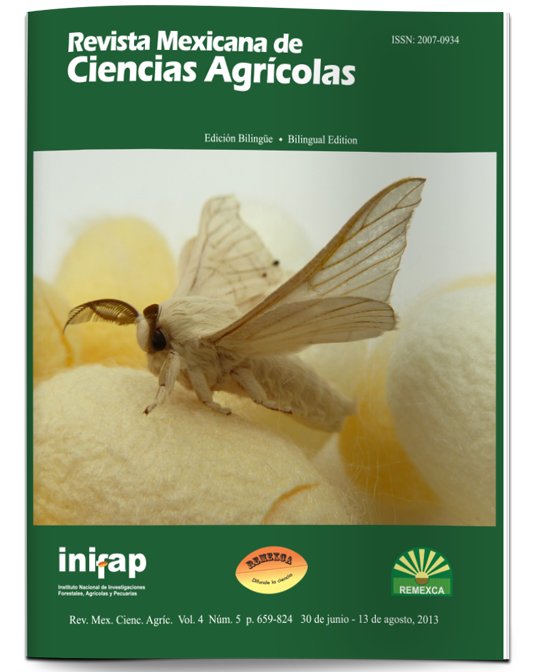Characterization of soils irrigated with wastewater for the establishment of an agroforestry system
DOI:
https://doi.org/10.29312/remexca.v4i5.1180Keywords:
Irrigation District 028, Kochia scoparia, participatory workshops, Prosopis laevigataAbstract
For more than 50 years, farmers have been using wastewater to irrigate feed crops in the Irrigation District 028 (DDR 028) of Tulancingo, in the state of Hidalgo. This practice, although useful for the production of feed crops, has caused several problems. The farmers of the ejido of San Nicolás Cebolletas, where the cost of pumping water for irrigation is very high, use residual waters, as do also the farmers of Santa Ana, where the salinity of the soil is evident. In view of this, the objective of this study was to characterize physicochemically the soils of this area (two ejidos) in order to establish an agroforestry system with a timber and an agricultural species, adapted to the present conditions. In addition, participatory workshops were held in order to engage producers in the decision making process regarding the implementation of such a system. The soils have no deficiency of K, P, Ca, Mg and Zn; however, the percentages of organic matter and of inorganic nitrogen content are poor, the texture is frank and the concentration of heavy metals is low. Based on the results from soil analyses and the opinions of the producers who participated in the workshops, a proposal was made to establish the agroforestry system (kochia-mesquite) under a design of boundary trees. According to the results obtained from the analysis of the soils, of the costs of installation of the system ($5890.00), and of the expected yields (46.70 t ha-1), it was concluded that agroforestry plantation is technically acceptable for this type of soil.
Downloads
Downloads
Published
How to Cite
Issue
Section
License
The authors who publish in Revista Mexicana de Ciencias Agrícolas accept the following conditions:
In accordance with copyright laws, Revista Mexicana de Ciencias Agrícolas recognizes and respects the authors’ moral right and ownership of property rights which will be transferred to the journal for dissemination in open access. Invariably, all the authors have to sign a letter of transfer of property rights and of originality of the article to Instituto Nacional de Investigaciones Forestales, Agrícolas y Pecuarias (INIFAP) [National Institute of Forestry, Agricultural and Livestock Research]. The author(s) must pay a fee for the reception of articles before proceeding to editorial review.
All the texts published by Revista Mexicana de Ciencias Agrícolas —with no exception— are distributed under a Creative Commons License Attribution-NonCommercial 4.0 International (CC BY-NC 4.0), which allows third parties to use the publication as long as the work’s authorship and its first publication in this journal are mentioned.
The author(s) can enter into independent and additional contractual agreements for the nonexclusive distribution of the version of the article published in Revista Mexicana de Ciencias Agrícolas (for example include it into an institutional repository or publish it in a book) as long as it is clearly and explicitly indicated that the work was published for the first time in Revista Mexicana de Ciencias Agrícolas.
For all the above, the authors shall send the Letter-transfer of Property Rights for the first publication duly filled in and signed by the author(s). This form must be sent as a PDF file to: revista_atm@yahoo.com.mx; cienciasagricola@inifap.gob.mx; remexca2017@gmail.
This work is licensed under a Creative Commons Attribution-Noncommercial 4.0 International license.



